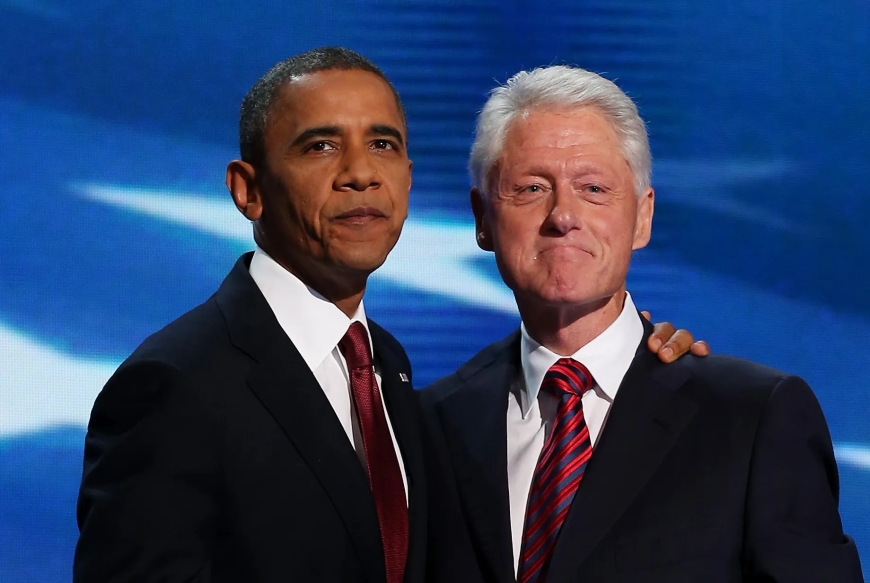A Strong Momentum for Kamala Harris as the 2024 Campaign Approaches

Its Peak Kamala Harris is poised to acquire a political edge uncommon among candidates as the 2024 presidential contest gets hot. A strong alliance of prominent people—Barack Obama, Bill Clinton, Michelle Obama, and Hillary Clinton—are stepping up their efforts to get support for Harris as the campaign draws to an end. Prominent historical figures well-known for their major contributions to Democratic politics are eager to use their clout to back Harris's candidacy and energize important voting populations. This project comes at a pivotal junctural.
The Democratic National Convention last month seemed to inspire the Obamas and Clintons, who have lately promised to actively assist Harris on the campaign road. The participation of well-known people emphasizes the strategic need to inspire Democratic supporters, especially in battleground areas where Harris has major obstacles and underlines the crucial character of the next election. Highly esteemed Democratic Party member Barack Obama is expected to take the stage. He is expected to plan a fundraising activity in Los Angeles soon and then take part in several important campaign meetings.
His appeal to the younger generation helps him to be a necessary figure. Obama's approach to involve young people via creative digital strategies, working with influencers and content creators to increase engagement, is one obvious feature. His active participation in digital voter outreach emphasizes the changing nature of modern elections and stresses the need of involving voters online as equally vital as more traditional campaigning strategies. Respected much, Michelle Obama will focus her efforts on improving voter registration and raising participation on topics she has fervuously championed for many years. Her message to voters at the DNC really resonated:
Democrats must not only support Kamala Harris but also actively participate in initiatives to guarantee her election. Her followers, particularly among women and younger voters, demographics essential for Harris' success, will relate to this sentiment. Although the Obamas are rather popular, the Clintons have unique political benefits of their own. Bill Clinton is expected to focus on voters in rural and Rust Belt areas, who usually have a major influence on the result of close elections. Since many voters still give economic issues top priority, the economic communication he created throughout his tenure in government and underlined in the 2012 campaign—where he was titled "explainer-in-chief—will be extremely crucial. Hillary Clinton's priorities will include addressing LGBTQ+ issues and supporting women's rights.
With Clinton expected to be a major ally for Harris in reaching out to suburban women, a group that is growing ever more important in the voting scene, this election cycle emphasizes reproductive freedom as a fundamental issue. Clinton's ability to mobilize women voters might have a big influence on the result, especially in states like Pennsylvania and Michigan that count most. For Harris, this strong support coincides at a perfect time. Harris has struggled to interact with some crucial voter groups even if she has political acumen and a lot of experience. According to polls, some groups—especially elderly white voters—continue to show resistance. Figures like President Joe Biden, who will keep a campaign presence alongside Harris, can be quite helpful. Biden's relationship with older, working-class voters combined with Harris's appeal to younger, more diverse populations might create a strong alliance.
The Harris campaign is clearly cognizant of the shifting dynamics of political influence since it is efficiently using digital surrogates and celebrity endorsements. Instead of depending just on traditional campaign operations, they are working with internet influencers able of contacting millions of potential voters with one post or video. The involvement of these powerful people shows a common belief among them that Harris is the candidate able to unite the Democratic Party and appeal to a broad spectrum of people. Their participation in the campaign not only energizes the Democratic fans but also presents to swing voters and independents that Harris is a strong candidate with the backing of the party's top leaders.
As Election Day draws near, the crucial question is whether this strong collection of political leaders can inspire enough people to change the result in Harris's favor. Harris's path toward success is clearly shaped by some of the most skilled and experienced people in modern American political scene, who clearly support her.













































